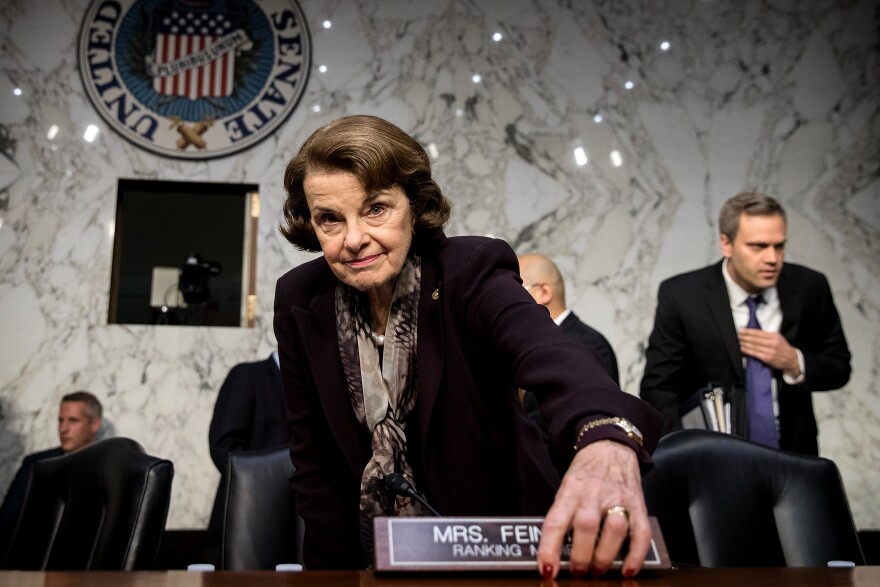Connecticut politicians are paying tribute to U.S. Sen. Dianne Feinstein of California, who died Thursday night.
U.S. Senator Chris Murphy said Feinstein, the oldest sitting U.S. senator, paved the way for the modern anti-gun violence movement.
"As a first-term senator in 1994, she defied the odds, beat the NRA, and passed the nation’s first-ever ban on assault weapons. That ban was in effect for 10 years, it saved countless lives," Murphy said. "Until the Sandy Hook tragedy, Diane Feinstein was often alone as the only major American political figure who was waking up every single day thinking about the gun violence epidemic."
Connecticut Sen. Richard Blumenthal said Feinstein was a valued friend who had qualities of loyalty and affection that are rare in Washington D.C.
"She was fearless and fierce — as an advocate of civil rights and liberties, of government accountability, of individual integrity in public service — and she will always be an inspiration for me because of her courage and smiling strength," Blumenthal said.
Feinstein, a centrist Democrat, was elected to the Senate in 1992 and broke gender barriers throughout her long career in politics. She was 90.
U.S. Rep. Rosa DeLauro, a Connecticut Democrat, said that Feinstein was a “dedicated public servant and an icon in American politics” as well as a “trailblazer for gun violence prevention.”
“Her unwavering commitment to justice, her tireless advocacy for commonsense gun control legislation, and her remarkable ability to bridge division in the Senate made her an inspiration to many, including myself,” DeLauro said.
Feinstein broke barriers for women in government, DeLauro said.
“She mentored women working in politics, pushed for legislation that promotes gender equality, and used her platform to encourage more women to seek elected office," DeLauro said. "She understood the importance of diverse voices in shaping lasting policy that helps the American people—and our nation is better-off because of her decades of public service.”
Feinstein was elected to the San Francisco Board of Supervisors in 1969 and became its first female president in 1978, the same year Mayor George Moscone was gunned down alongside Supervisor Harvey Milk at City Hall by Dan White, a disgruntled former supervisor.
Feinstein found Milk’s body, her finger slipping into a bullet hole as she felt for a pulse. It was a story she would retell often in the years ahead as she pushed for stricter gun control measures.
One of Feinstein’s most significant legislative accomplishments was early in her career, when the Senate approved her amendment to ban manufacturing and sales of certain types of assault weapons as part of a crime bill that President Bill Clinton signed into law in 1994. Though the assault weapons ban expired 10 years later and was never renewed or replaced, it was a poignant win after her early career had been significantly shaped by gun violence.
"She never faltered in her efforts to pass comprehensive gun control legislation to make our communities safer," DeLauro said.
Feinstein had little patience for Republicans and others who opposed her views on guns, though she was often challenged. In 1993, during debate on the assault weapons ban, Sen. Larry Craig, R-Idaho, accused her of having an insufficient knowledge of guns and the gun control issue.
Feinstein spoke fiercely of the violence she’d lived through in San Francisco and retorted: ''Senator, I know something about what firearms can do.”
Two decades later, after 20 children and six educators were killed in a horrific school shooting in Newtown, Connecticut, first-term Republican Sen. Ted Cruz of Texas similarly challenged Feinstein during debate on legislation that would have permanently banned the weapons.
"I'm not a sixth grader,” Feinstein snapped back at the much younger Cruz – a moment that later went viral.
She added: "It's fine you want to lecture me on the Constitution. I appreciate it. Just know I've been here a long time."
The Associated Press contributed to this report. This story has been updated.





